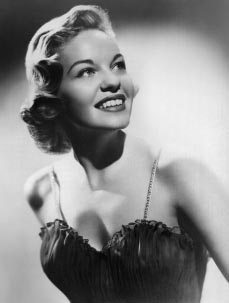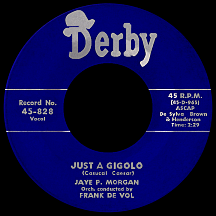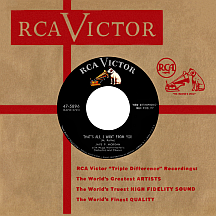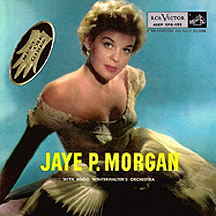JAYE P. MORGAN
So what's in a name, anyway? Can confusion reign if two or more names are the same or nearly so? That was a minor dilemma for Mary Margaret Morgan at the point where her professional career got under way around the age of 18. When she was a baby it was simpler; everyone she knew shared the Morgan surname. Father John Morgan and mother Josephine Owens Morgan performed publically with her four older brothers as The Morgan Family Variety Troupe. There were seven children in all (one brother and one sister didn't participate) and when she was added shortly after her third birthday in 1934, the act became The Morgan Family featuring Little Mary Morgan. Got it sorted out so far? 'Cause we aren't even up to the "same name" game yet!
The family lived in Mancos, Colorado in the southwestern corner of the state near Durango, but dare say did Mary (a.k.a. Jaye) remember much about the log cabin she was born in? The Family Troupe settled in Los Angeles and persevered for the next decade making the rounds of west coast theaters and singing on L.A. radio station KNX (a CBS affiliate). In 1945 her father passed away (he was in his mid-sixties) and just like that the family's entertainment career ended...though 14-year-old Mary, and her brotherly quartet, had showbiz in their blood and weren't about to quit so easily. While attending Verdugo Hills High in Tujunga, she was elected class treasurer and that's where she got her nickname, J.P., after turn-of-the-century multi-millionaire banker J.P. Morgan, whose moniker entered pop culture slang for "mister (or miss) moneybags." Though she was J.P. to schoolmates, she retained her not-so-little-anymore given name, Mary Morgan, when performing in L.A.-area nightclubs (bold enough to pull it off, even at 15). An obsessed fan of jazz-styled acts (Ella, Nat, Billie and Lena and bandleaders Duke, Benny and Basie), her renditions of their famous songs possessed a maturity beyond her years.
The musical sideline kept things interesting during those four years of "higher education" and freedom finally arrived in 1949. She got a job singing with Hank Penny, a well-known "hillbilly and western" artist who recorded for RCA Victor. After Penny heard bandleader Frank DeVol was looking for a female vocalist, she auditioned in a way few have been asked to, by jumping in feet first in front of a large audience at the Hollywood Palladium (nerves? Not an issue after some 15 years spent getting comfortable on stages). DeVol was duly impressed and hired her, but didn't think "Mary Morgan" would work on marquees or people's lips, what with Marion Morgan already well-established as a vocalist with Harry James' band. She suggested using her nickname, J.P.; Frank thought it was a pretty wacky idea and countered with a feminine spelling of the first letter. The career of Jaye P. Morgan was under way...pronounced exactly the same as that of the long-gone tycoon banker.
From 1950 to '53 she was a regular fixture with DeVol's band. He wasn't just her boss, but a fan of her unique, throaty voice and confident stage presence. Feeling she deserved more than he could offer, they recorded an audition disc, hoping for a chance at a contract with Capitol Records (her brother, Charlie Morgan, had recently recorded for Capitol with country band Andy Parker and the Plainsmen), but they didn't tumble. She continued working on-and-off with Penny and found her way into a studio, making her first recordings with his band in November 1951, returning for more sessions in '52 that resulted in six sides billed as Hank Penny Plain Ol' Country Boy with Jaye P. Morgan; "Makin' Love Tennessee Style," "That's My Weakness Now" and "Fan It" are fun, feelgood contributions to the country genre and appeared on RCA Victor singles between late '52 and the spring of '53.
Then she was signed to Larry Newton's Derby Records, a small New York-based label that had achieved some success with saxophonist Freddie Mitchell and blonde singer and former beauty pageant gal Sunny Gale. Jaye had five singles released over the next year, all of them with DeVol's orchestra, and scored with a torchy delivery on "Just a Gigolo" (a Viennese tune composed by Leonello Casucci in 1928 with additional writing credit to Irving Caesar), followed by a more easygoing take on "Life is Just a Bowl of Cherries" (a Ray Henderson-Lew Brown ditty from the Broadway show George White's Scandals of 1931). Both singles achieved listings on Variety magazine's record charts. About this time she made the jump to television as a regular singer on The Robert Q. Lewis Show on CBS. In 1954, she lent her vocal talents to the popular ABC-TV game show Stop the Music (a precursor to Name That Tune).
RCA Victor was rife with popular male singers in the mid-'50s: Perry Como, Tony Martin, Eddie Fisher, Mario Lanza, The Ames Brothers and country acts Hank Snow and Eddy Arnold were all selling records like crazy. Their female roster, in need of some shoring up, included Dinah Shore and relative newcomer June Valli (also a Stop the Music regular), standing in the shadows of their main male hitmakers. With all her recent exposure, Jaye was no longer "hiding out" as Hank Penny's inconspicuous duet partner. A deal was made late in the year for her exit from Derby and she joined the roster of the major record company. Working mainly with orchestral arranger Hugo Winterhalter, who knew a thing or two about making hit records, she found herself in a prime position for top-tier stardom. First impression: "That's All I Want From You" by Austrian author, theatrical playwright and occasional songwriter Fritz Rotter (using a pseudonym, "M. Rotha"). The lyrics ('A little love that slowly grows and grows, not one that comes and goes...that's all I want...'), as delivered by Jaye, sublimely conveyed the overly-hopeful message. Covers hit the market immediately (by Dean Martin, Bing Crosby and others including a hit R&B version by Dinah Washington), but the competition had fallen behind by February 1955 as Jaye P.'s disc advanced to the top five sellers.
RCA quickly followed with "Danger! Heartbreak Ahead," a softly-rendered performance despite the exclamation point in its title, and a top 20 hit in April. The label teamed her with its premier singer, Perry Como, for a two-sided hit, "Chee Chee-o Chee (Sang the Little Bird)," a cute, childlike song with a Mitchell Ayres arrangement (containing a touch of Latin rhythm a la RCA's Mambo man Perez Prado), backed with "Two Lost Souls" from Broadway's hottest musical, Damn Yankees. Next came a signature Winterhalter production, "The Longest Walk," with one of Jaye's best vocal performances, a top ten radio hit and top 20 seller that summer. Bandleader Joe Thomas backed her on the next single, "Pepper-Hot Baby," a bouncy, sexy number (...'count to a hundred, ooo-lah!'); she voiced her preference for older standards over this type of "teen-oriented" fare, as she considered it, but the result was infectious nonetheless. Music industry reviewers were in agreement that, with six hits in less than 12 months, she ranked as one of 1955's hottest breakthrough artists.
Jaye P.'s four siblings, The Morgan Brothers, were signed to RCA as well and had two singles issued that year ("In Madrid" and "Walk Along With Kings"), but Charlie, Bobby, Duke and Dick Morgan would have to wait a few more years before seeing any chart action. The Jaye P. Morgan Show, a 15-minute syndicated musical program, premiered in January 1956 with the Morgan Brothers as regulars; the series lasted several months and the five siblings toured together the following year. Her 1956 singles kept the vocal spark of the previous year's offerings, yet fell far short of the popularity of the previous year's output. The best, perhaps, was another duet, this time with country headliner Eddy Arnold; "Mutual Admiration Society," from the Monaco-set Broadway musical Happy Hunting, arguably worked better as a duet, yet the disc was overshadowed by Teresa Brewer's solo version.

The label began pairing her with other arrangers (her longtime musical director, Frank DeVol, stepped up, as did the prolific Neal Hefti and Arkansas-to-N.Y. songwriter-arranger O.B. Massingill. Her professional name became an issue again as Jane Morgan (not what it says on her birth certificate!) hit the scene in a big way after several years on the fringes. Thankfully, there was no confusion and the two singers coexisted without cause to clash. In late 1958, Jaye and her brothers signed separate contracts with MGM Records and found themselves inhabiting the national charts simultaneously in early '59, they with "Nola" (a standard penned by Felix Arndt and Sunny Skylar dating to 1915), she with "Are You Lonesome Tonight" (a 1920s tune by New Yorkers Roy Turk and Lou Handman that Elvis Presley sent into the stratosphere nearly two years later). She struggled to gain much traction with MGM; a pop remake of the Johnny Cash classic "I Walk the Line" made a respectable showing in the fall of 1960. Then there was her right-turn, two-LP project that reacted to the historical trend in music spearheaded by Johnny Horton's string of hits: Jaye P. Morgan Up North and Jaye P. Morgan Down South had her working (against type) both sides of the century-old Civil War confict.
A comedic appearance with John Wayne on a November 1960 episode of The Jack Benny Program jumpstarted her acting career. She went on the road, performing in a stage version of Annie Get Your Gun in Pittsburgh and Chicago, then followed it with Guys and Dolls costarring Tony Martin and Alan King in '61 and a string of Summer Stock productions (The Tender Trap, The Unsinkable Molly Brown, The Pajama Game and Funny Girl) over the next few years. On television, Jaye did guest shots on drama series (General Electric Theater, The Eleventh Hour) and comedies (Jackie Cooper's navy sitcom Hennessey, The Joey Bishop Show and The Danny Thomas Show) between 1961 and '64. Setting her recording career aside at this point, she focused on acting, though opportunities were sparse; there were two episodes of My Three Sons, a Vacation Playhouse presentation and not much else. She was a celebrity panelist on a number of all-but-forgotten game shows from the mid-'60s including You Don't Say, Stump the Stars, What's This Song? and I'll Bet.
The talk show circuit unpredictably became the venue where she regained her star power, starting with a September 1969 visit to The Tonight Show; guest appearances on prime time series had involved her singing and/or acting, but this time around she shifted to conversation and pulled no punches, showing an irreverent, flirtatious side that appealed greatly to host Johnny Carson. He invited her back dozens of times over the next six years and she got the call from other popular talk shows hosted by Dinah Shore, Merv Griffin and Mike Douglas. Her music career was back on track too, starting with "Love of a Gentle Man" on the Beverly Hills label, which reached the top 40 of Billboard's Easy Listening chart in January 1970. A cover of "What Are You Doing the Rest of Your Life" ('...north and south and east and west of your life?'), an Oscar-nominated song from The Happy Ending starring Jean Simmons, was also an Easy Listening hit, timed just prior to the Oscars telecast in April. One can only imagine her performance on the live, high-rated awards show, but it was not to be; the song's brilliant-composer-but-borderline-singer Michel Legrand had the honor. Hey, it was his song; what can you do? Jaye P.'s final chart single came in 1971 with Leon Russell's "A Song For You."
The talk show appearances were supplemented with film roles (Jon Voight vehicle The All-American Boy, 1973) and occasional TV series guest shots, more game show stints (Hollywood Squares, Match Game '73, Break the Bank) and most famously The Gong Show, Chuck Barris's infamous daily talent/no-talent event (many purposely bad contestants!) that ran from 1976 to 1978 on NBC and '78 to '80 in syndication. Jaye didn't shy away from making risque comments for the sake of a laugh; the show's off-color antics were ramped-up during its run (the main reason, it appears, for the network's cancellation). She continued singing, her voice and delivery as strong as ever, with a detour into disco in 1976 on the Candor label and a more softly-rendered album, Lately!, on the Palace label seven years later. Jaye P. Morgan's last notable appearance prior to retirement was an acting role of sorts: she portrayed herself in Confessions of a Dangerous Mind, the 2002 Barris biopic that ventured deeper into the Gong Show phenomenon.
NOTABLE SINGLES:
- Makin' Love Tennessee Style - 1952
by Hank Penny Plain Ol' Country Boy with Jaye P. Morgan - That's My Weakness Now - 1953
by Hank Penny Plain Ol' Country Boy with Jaye P. Morgan - Fan It - 1953
by Hank Penny Plain Ol' Country Boy with Jaye P. Morgan - Just a Gigolo - 1953
- I Ain't Got the Man - 1953
- Life is Just a Bowl of Cherries - 1954
- Ring Telephone Ring - 1954
- Nobody Met the Train - 1954
- That's All I Want From You - 1955
- Danger! Heartbreak Ahead - 1955
- Have You Ever Been Lonely (Have You Ever Been Blue) - 1955
- Chee Chee-oo Chee (Sang the Little Bird) - 1955
by Perry Como and Jaye P. Morgan /
Two Lost Souls - 1955
by Perry Como and Jaye P. Morgan - The Longest Walk - 1955
- Pepper-Hot Baby /
If You Don't Want My Love - 1955 - Not One Goodbye - 1956
- Sweet Lips /
Get Up! Get Up! (You Sleepyhead) - 1956 - Lost in the Shuffle /
Play for Keeps - 1956 - Johnny Casanova - 1956
- Just Love Me - 1956
- Mutual Admiration Society - 1956
by Eddy Arnold and Jaye P. Morgan - I Thought it Was Over - 1957
- Do You Love Me - 1957
by Jaye P. Morgan and Eddy Arnold - I Know, I Know, I Know - 1958
by Jaye P. Morgan and the Morgan Brothers - Just You, Just Me - 1958
- Are You Lonesome Tonight /
Miss You - 1959 - I Walk the Line - 1960
- A Heartache Named Johnny - 1962
- Love of a Gentle Man - 1970
- What Are You Doing the Rest of Your Life - 1970
- A Song for You - 1971




